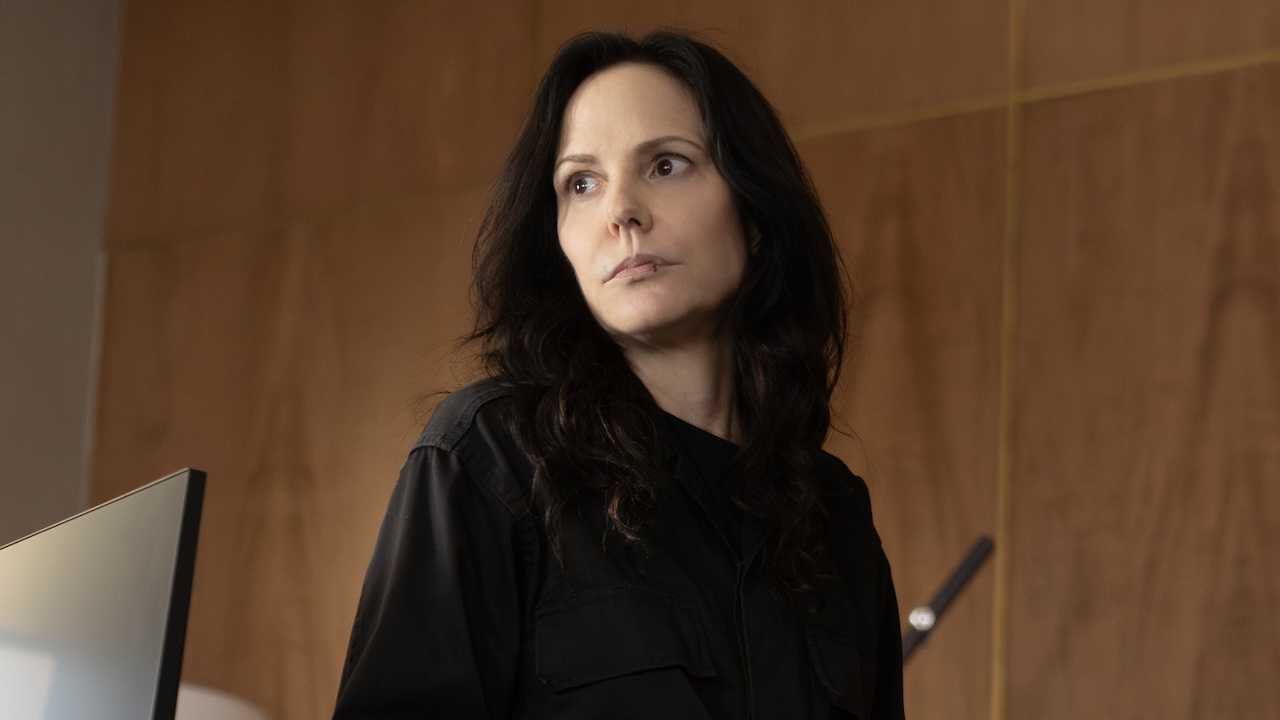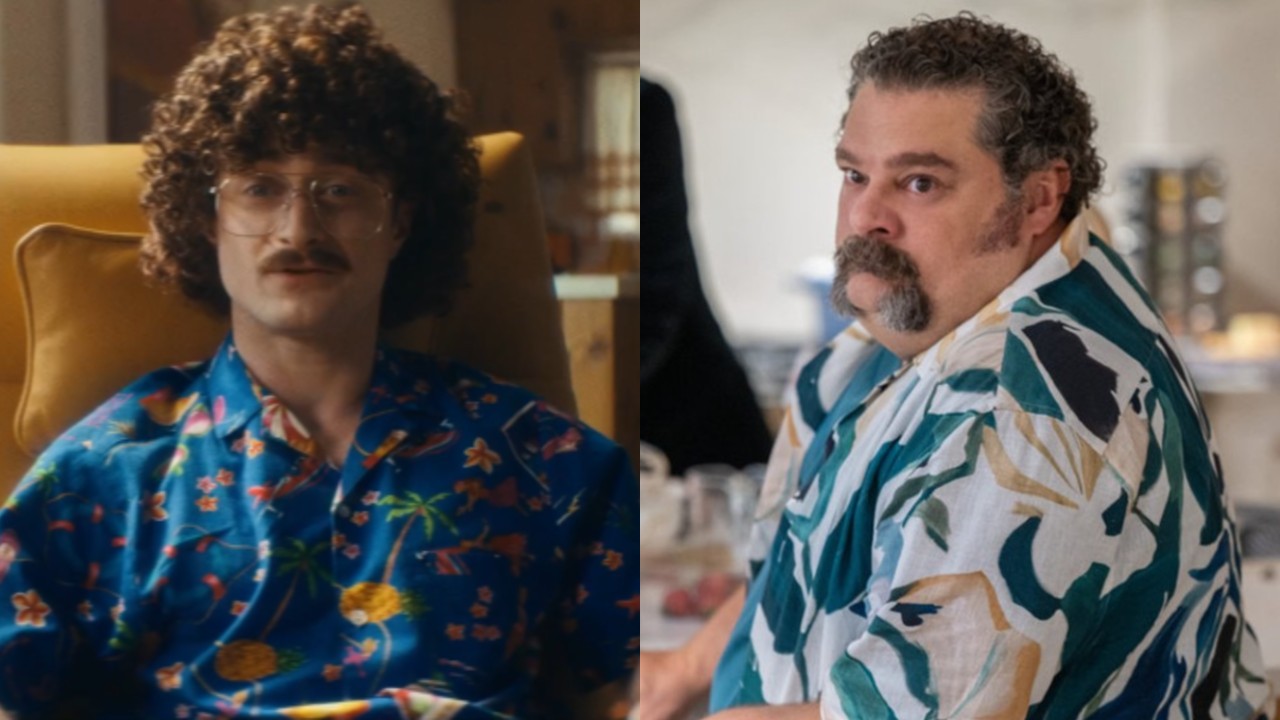Mary-Louise Parker Talked To Me About Playing Her First Major Villain In Stephen King's 'The Institute,' And Her Thoughts On Ms. Sigsby’s Book-Changing Ending
You just can't keep a good child-torturer down.
Your Daily Blend of Entertainment News
You are now subscribed
Your newsletter sign-up was successful
Major spoilers below for anyone who doesn’t have precognition abilities and who hasn’t yet streamed The Institute’s Season 1 finale on MGM+, so be warned!
Mary-Louise Parker has portrayed myriad empathy-earning characters throughout her career, from Fried Green Tomatoes’ Ruth to Angels in America’s Harper to even Weeds’ Nancy. She’s not known for villainous roles, at least not until joining The Institute, her second streaming Stephen King adaptation. (Her first: the excellent-if-underseen Mr. Mercedes.) Novel readers likely expected her nefarious child-torturing Ms. Sigsby to get killed off by Season 1’s conclusion, but the live-action series kept things open-ended, and the Season 2 renewal couldn’t have been timed better.
As seen in the video above, the Emmy-winning actress spoke with CinemaBlend after I’d watched the entirety of the first season, and I had to know if Ms. Sigsby’s fate was always planned as a deviation from the novel, the same way the main characters’ ages were changed for TV. I also asked her thoughts on playing such a ruthless character without all of the usual villainous tropes. So let’s strap on all those electrodes and dig in.

Mary-Louise Parker On What Makes Ms. Sigsby Such A Dangerous Villain
I’ll freely admit to having some recognition bias while watching The Institute, as I found it hard to 100% buy into Ms. Sigsby as being as amoral a villain as it appeared, despite any and all signs indicating otherwise. Such is Parker’s innate charisma and likeability, I suppose. But in describing her character’s moral fibers, Mary-Louise Parker certainly didn’t candycoat things, pointing out why the facility leader is such a threat, which in turns makes it all the more interesting for her to portray. As she put it:
Yeah, she's pretty dark. I think there's some kind of part of her psyche that's just worn away, or was never there to begin with; it's hard to say. I think just for so long, repeatedly abusing people, young people especially, and hurting them and going back and doing it again, I think, has eaten away at whatever kind of like moral center she ever had. And so it's just this belief that she's doing the right thing for the world that makes her so dangerous, and that she kind of clings to that and is willing to do anything for it, is what makes her interesting to play.
On the spectrum of Stephen King's most dreadful villains, Ms. Sigsby might not even rank all that high based solely on her social demeanor, since she can often appear to be a logical and level-headed person on the surface. Of. course, no level-headed person would choose to be responsible for daily torture sessions with teens and tweens, but even that is arguably up for debate in her case. (In that her unwillingness or inability to do her job would likely result in her death, taking free will mostly out of the equation.)
Muddying up things even more is the reason Sigsby gives for going through everything she and others have done at the Institute location in Dennison River Bend. Supposedly, the kids going through the back-half process are being used to stop potentially armageddon-level events foreseen through precognition. Without clear-cut proof of that, however, the tortured children's group actions appear more plainly to be telekinesis-aided murder.
Mary-Louise Parker agrees that a nugget of something ostensibly virtuous can be gleaned from Sigsby's explanation, but that it doesn't hold much water given these specific circumstances. In her words:
Your Daily Blend of Entertainment News
She's troubled. And I think when you hear her lay it out, and when you hear her explain her whole point of view, it almost makes some kind of sense. It approaches making sense; like, it allows for a conversation of her potentially making sense. But at the same time, it's like, you know, you're torturing people. So it's really hard to reconcile that.
I guess it would be hard for anyone in Sigsby's world to maintain a non-antagonistic reputation, despite any such high-minded ideals as the justification. And to be sure, emptying all those kids of their quality of life is far different and more evil than Luke sacrificing everyone still inside The Institute when he destroyed it. Luke's definitely one of the heroes here....right?

Ms. Sigsby's Fate Was A Huge Change From Stephen King's Novel, And Mary-Louise Parker Has A Hope For Her Ending
The Institute's finale kept certain details intact from the source material, including Avery's death, but also features numerous detail changes from the source material, and doesn't quite explore the ramifications of using precogs to try and alter future events. Anything that was left out of the novel makes more sense with the context of the Season 2 renewal, which co-creators Jack Bender and Benjamin Cavell were bullish about from the start.
The same can be said about the choice to keep Ms. Sigsby alive in the end. On the page, the character gets an unfortunately non-marquee death, as she's mistakenly shot by guards believing her to be someone else. In the series, not only does she survive relatively unharmed, but she also hitches a ride off to Whereversville with the highly incriminating USB stick in her possession, presumably giving her a powerful advantage when Season 2 arrives.
When I asked if Ms. Sigsby's final moments were originally going to stay faithful to the book, or if changes were in play from the start, she answered with:
In the beginning, I think that's what they had planned. They might say differently, but I felt like when we started shooting, that was kind of the thought, but then, I don't know, they might say differently. But I didn't really know until close to the end what was going to happen with her. And I still don't know exactly what's going to happen with her. I just hope it's extreme, whatever it is, and that I get to do it.
While Parker couldn't say with certainty, she implied that Ms. Sigsby was more likely to be a goner by the end of Season 1, and that the plans may have changed at some point. Whether or not that was the case, I think most would agree that keeping the villain alive was the best move, regardless of where the story goes next. Especially since Stephen King never wrote anything that could serve as source material for the second season.
I side with Mary-Louise Parker here in hoping that Sigsby meets up with an extreme ending, even if she isn't the most outwardly monstrous character, and even if she tries to redeem herself in Season 2 with the USB device. Hard to come back from child torture no matter what the specifics.
Stay tuned for The Institute Season 2 updates, and rewatch Season 1 at any point on MGM+.

Nick is a Cajun Country native and an Assistant Managing Editor with a focus on TV and features. His humble origin story with CinemaBlend began all the way back in the pre-streaming era, circa 2009, as a freelancing DVD reviewer and TV recapper. Nick leapfrogged over to the small screen to cover more and more television news and interviews, eventually taking over the section for the current era and covering topics like Yellowstone, The Walking Dead and horror. Born in Louisiana and currently living in Texas — Who Dat Nation over America’s Team all day, all night — Nick spent several years in the hospitality industry, and also worked as a 911 operator. If you ever happened to hear his music or read his comics/short stories, you have his sympathy.
You must confirm your public display name before commenting
Please logout and then login again, you will then be prompted to enter your display name.
